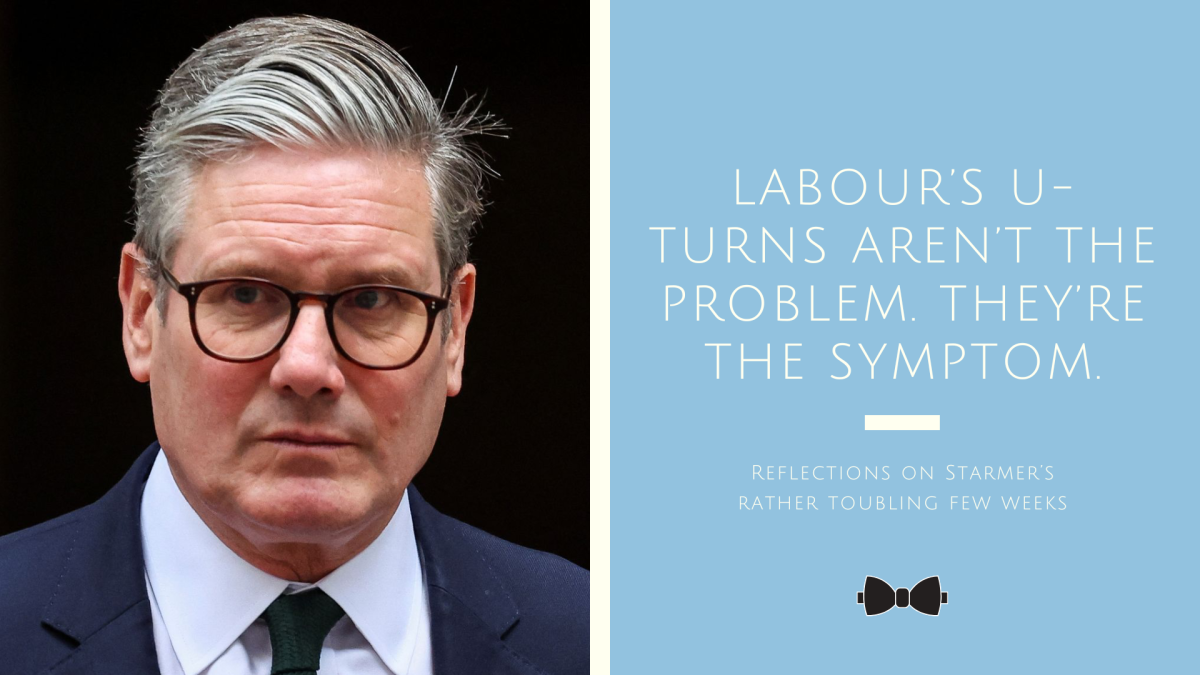To say it’s been a rocky few weeks for Keir Starmer’s Labour government would be, at best, incredibly generous — and at worst, a gross simplification.
In fairness, it’s probably more accurate to say that Labour’s first year in government has been far from what Starmer and his team might have imagined and hoped for just 12 short months ago. Riding the coat-tails of an historic general election win — delivering one of the largest parliamentary majorities in history on the back of the mantra “Change” — many in the Labour Party must have felt this was going to be Tony Blair 1997: version 2.0.
But the reality couldn’t be further from this. Just a few weeks into Starmer’s government, the country was plunged into crisis mode, thanks to the Farage Riots (and yes, I use this term deliberately). In Starmer’s defence, his handling of the situation was exemplary. But despite the swift resolution he brought about, rather than celebrating his success, the “two-tier Keir” narrative took root in the UK media.
Since then, it’s felt like the government hasn’t been able to catch a break. Not all of it is their fault. We have to face the reality that much of the UK’s print media is still controlled by a right-wing elite who haven’t quite recovered from their side losing so spectacularly.
But as I’ve reflected on the calamity of the past few weeks’ U-turns and policy about turns, I’ve come to realise that a large portion of the blame for Labour’s almost-non-existent honeymoon rests with the government itself. The last few weeks have seen two major policy U-turns: first on the winter fuel allowance, and now, just this week, on welfare system reforms. (I’m not even counting the so-called U-turn on the grooming gangs inquiry — that wasn’t a U-turn. It was a decision based on new evidence, and it was never something explicitly ruled out in the first place.)
But I don’t think the U-turns themselves are the problem. I think they’re symptoms of much bigger issues facing Starmer’s government.
Labour’s communications have been awful
As a communications professional, what offends me most is just how woeful Labour’s PR operation has been since they walked through the door of Number 10. I’m not sure whether Starmer has shuffled the comms team, but the difference between Labour in opposition and Labour in government is night and day.
At work we hammer one point home: effective communication is rooted in great storytelling. No matter your age, you latch onto a story. It gives shape to dry facts, frames the stakes, and lets people see themselves in the outcome.
Think about any big change‑management programme. You bring people along by laying out the context and the “why” before you bombard them with charts and cost lines. Labour’s approach has been flipped: start with the ledger, make the fiscal case, and only then scramble to throw a human narrative around it when absolutely pushed to by inquisitive journalists.
I’m not claiming to be the oracle of comms (though, given the current competition, maybe I should apply). But if I can see this flaw from here, how can the Downing Street comms machine miss it? I only ever hear the faintest whispers of a story crafted after the announcement has been made — usually when Nick Ferrari harangues a minister on LBC. By then, the silence has already let the right‑wing press spin its own headline. A vacuum loves nothing more than a screaming tabloid front page.
And when the story finally arrives, it’s hardly compelling. Take the welfare reform bill. Ministers sold it as a balance‑sheet tidy-up: save billions, steady the economy, job done. Inspiring stuff… said no one ever. Why not lead with people? Tell the country this bill is about lifting citizens out of the benefits cul-de-sac, helping those we are able, rediscover their independence, and making sure the state stands beside them as they rebuild their lives.
That, to my mind, beats “we’re trimming the budget, sorry about your safety net.”
And it’s not just me who thinks the government’s communications have been lacking. Scarborough and Whitby’s Labour MP, Alison Hume, agreed with me on that very point while out canvassing for a recent local by-election.
Oh, and guess who won that in the end…
Reform first, think later…
The frantic pace of Labour’s policymaking is starting to feel less like ambition and more like panic. There’s a sense that Starmer and his team are so desperate to be seen as doing something — anything — that proper consultation and forethought are being cast aside. The result? U-turns, confusion, and a shaky-looking government that’s rapidly losing credibility.
Take the winter fuel allowance debacle. The revised version — in principle — made far more sense than the original. Although personally, I think they went too far with the £35,000 a year income threshold. I know plenty of people my age who don’t earn that. Where’s their help? Can they claim assistance with their energy bills through the winter?
The same thing happened with the welfare reform bill. The original proposals were so politically tone-deaf it’s almost baffling they made it to the announcement stage. The revised version — branded as “watered down” — is, in reality, far more balanced and coherent. It’s as if someone finally paused to ask the most basic question: “What are we actually trying to achieve here?”
This all proves one thing: if the government just took a little more time to think through the reforms they want to make, they could spare themselves — and those of us who genuinely want to see them succeed — all this avoidable toing and froing.
In the wake of the disappointing-yet-hardly-surprising result of the Runcorn by-election, where Reform UK claimed their fifth MP, Keir Starmer said this:
“The message I take away from these results is: we must deliver that change even more quickly.”
Watch on YouTube
That post-match analysis says it all. It confirms the government’s current modus operandi: do things as quickly as possible to show people we’re doing something — and to head off the growing challenge from Reform UK.
If anything, it shows the immense pressure both Labour and the Conservatives are feeling from Nigel Farage’s latest vanity project–cum–political party. And unfortunately, Farage has a long-standing knack for shaping policy and hijacking the national conversation from wherever he happens to be in the world (spoiler alert: it’s never Clacton). So instead of acting like the responsible, grown-up, and pragmatic government many people voted for last year, Labour are chasing the spectre of Reform UK — doing whatever it takes to be seen to be doing something “positive.”
And nowhere has this been more obvious than in their recent anti-immigrant rhetoric. Bragging about deportation figures and celebrating midnight raids on so-called “illegals” isn’t a good look, Keir. It’s not principled leadership — it’s pandering with a blue rosette.
What makes it so frustrating is that Starmer and his government have shown they’re capable of making tough, well-thought-out policy and standing by it in the face of right-wing outrage. The introduction of VAT on private school fees, the scrapping of inheritance tax exemptions for farmers, and the strengthening of workers’ rights are all genuinely brilliant policies.
We need more of that, please.
Ministers meet reality
No one said being in government was easy — especially after 14 years in opposition. The vast majority of Labour’s frontbenchers have never held ministerial office before. But some of them have, and the Prime Minister used to be the Director of Public Prosecutions. So the government isn’t completely devoid of political experience.
But the most troubling thing of all is just how inexperienced the government looks. The U-turns, the lack of any real political ideology to speak of, the awful communications, the relentless pace of change — all of it points to a team that either lacks common sense or lacks effective advisers.
Trust me: I would pick this government over any of the Conservative ones from the last 11 years (no, I didn’t mind the coalition — sue me). Labour’s 14 years in opposition and Starmer’s five as leader gave them more than enough time to craft a genuinely solid package of policies that I firmly believe will improve the country.
The bit they seem to have forgotten is the how. Which, when you’re in government with a huge majority, is pretty close to unforgivable.
Does this lack of experience worry me in the long term? A bit. But let’s be honest — if we can survive Boris Johnson and Liz Truss, we can survive this. Still, if the government continues down this same path, I fear it will only embolden Nigel Farage and Reform UK. The latest MRP poll from YouGov had them as the largest party in a hung parliament. There’s a real chance they could form the next government — and that does terrify me.
Where to now then, gov?
We shouldn’t lose all hope. After all, we’re still only in the first year of a five-year parliament. A lot can change between now and the next election. And I think it will.
Starmer is, I suspect, a lot more ruthless than people give him credit for. If he decides that cutting loose some deadwood will improve Labour’s chances in 2029, he absolutely won’t hesitate to reshuffle — and I think we could see some big names moved around.
But for the government to stand any chance of fighting off the challenge from Reform UK, three things need to happen: better communications, better pacing, more experienced people.
Oh — and for me to consider voting Labour again, a stronger stance on transgender rights, please. Think more Ed Davey and less JK Rowling.

